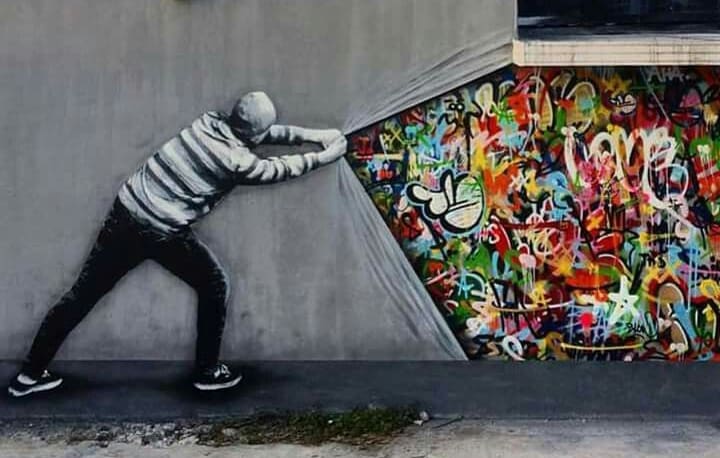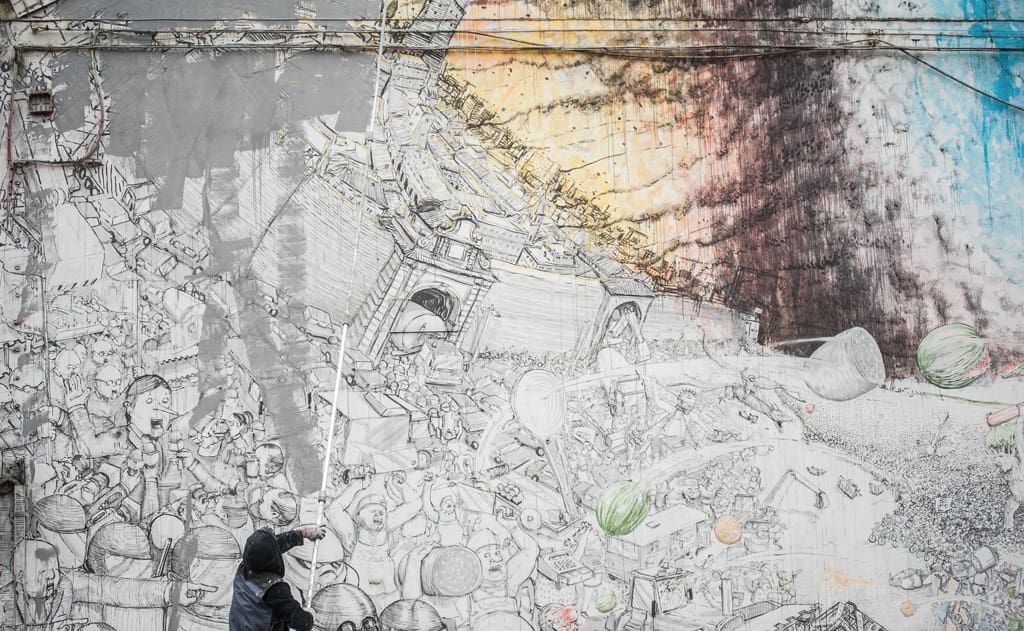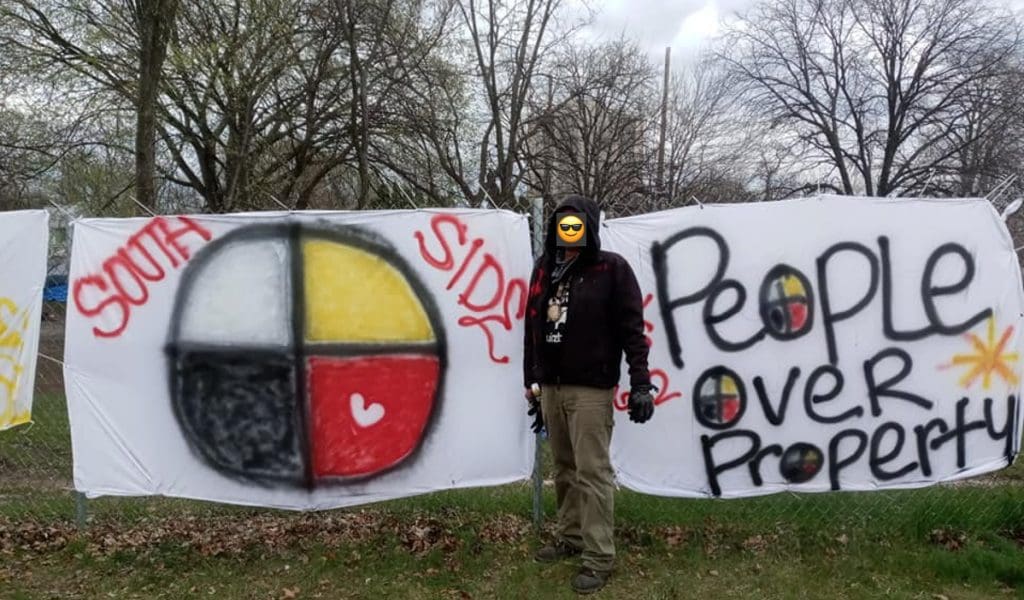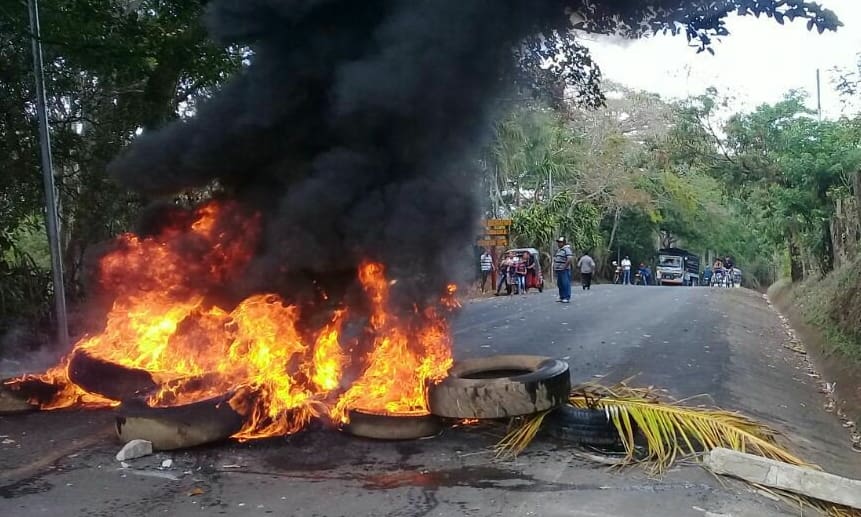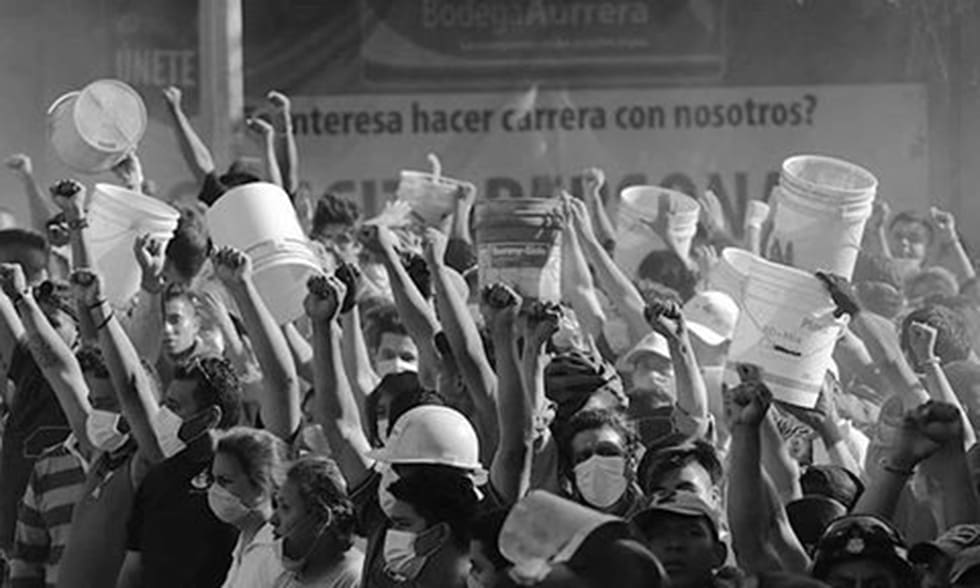Transcribed from the 21 October 2017 episode of This is Hell! Radio (Chicago) and printed with permission. Edited for space and readability. Listen to to the whole interview:
Within the free market framework, racism—the fundamental, systemic, and structural racism that is the bedrock of our economy—becomes invisible. People blame individuals for their failure to thrive within a poisoned and poisonous system.
Chuck Mertz: Financialization leads to racism. Financialization leads to authoritarianism. financialization leads to disparity, inequality. It destroys communities, it’s a threat to our planet…and it’s the backbone of today’s economy.
Here to tell us what makes financialization so damn evil: author, organizer, and educator Max Haiven wrote the ROAR Magazine article “Financialization, Precarity, and Reactionary Authoritarianism,” which is an excerpt from his prescient 2014 book Cultures of Financialization: Fictitious Capital in Popular Culture and Everyday Life, released last month in paperback. Max is the co-director of the Radical Imagination Project.
Welcome back to This is Hell!, Max.
Max Haiven: It’s a pleasure to be here.
CM: You’re concerned about the precariousness caused by financialization. As University of London professor Costas Lapavitsas has written, “Financialization conveys the penetration of the financial system into every nook and cranny of society, including housing, education, health, and other areas of life that were previously relatively immune. Evidence that financialization represents a deep transformation of mature economies is offered by the global crisis of 2007-2009. The penetration of finance into the everyday life of households has changed the outlook, mentality, and even morality of daily life. Financial calculation evaluates everything in dollars and cents, transforming the most basic goods—above all housing—into investments. Its logic has affected even the young, who have traditionally been idealistic and scornful of pecuniary calculation.”
How aware do you think the public is of the negative impact of financialization? In particular, those who are angry with what the United States has become, with less stable job security, stagnating wages, greater wealth disparity: how aware are they that it’s all linked to financialization?
MH: There is an awareness of the effects of financialization, in the sense that the vast majority of the population who don’t happen to be extremely wealthy feel like somebody constantly has a hand in their pocket taking their money. Part of the financialization scheme is not only the fact that we’re constantly in debt or constantly being forced to invest in various things in order to protect ourselves from the market. It also has to do with the increase of fines, the increase of fees, and the sense that you can’t turn anywhere without having to pay someone.
The problem is that although a huge number of people are extremely aware of the effects of this, they’re not aware of the cause. They’re not aware of the systemic characteristic, and instead they—at least many white people—imagine that the hand in their pocket is that of racialized people, of “special interest groups” that the government is allegedly giving handouts to. There’s an awareness of what is happening, but there’s not an awareness of the system that’s behind it, and in the absence of an awareness of that system, we see the rise and growth of revanchist and furious forms of racism and marginalization.
CM: You write, “Within today’s financialized world, precariousness is the norm, not the exception. It is worse than many such manifestations precisely because it is so successful in privatizing precariousness through the logic of individualism and competition.”
How much do individualism and competition cause job insecurity? Is an embrace of individualism at odds with having steady and secure jobs? I often hear the same people praising individualism and competition but complaining about the lack of work stability.
MH: On some level, individuality is a good thing. Many of us have been arguing for years that people need to have a sense of agency over who they are, how they define themselves, and how they express themselves. The problem is that when we tie our sense of individuality to the market and to our ability to compete with one another for money, we do a grave injustice to our own individuality and our own creativity and imagination, and we also contribute to a system that is objectively destroying us and destroying the world.
In a way, we’ve been sold the lie that in order to lead the life that we want, in order to actualize ourselves, in order to express our creativity and imagination, we need to throw ourselves headlong into the market and adopt the mantle of the entrepreneur or the financier. But the problem is that this actually contributes to a system of vast inequality and suffering, where even the most enthusiastic among those who take up this social role of being the investor and the entrepreneur—even among the most enthusiastic, the vast majority will fail. And when they fail, there is no safety net anymore to catch them.
It’s a pretty destructive ideology, to say the least.
CM: To what degree do you think our lack of being critical of the system is rooted in racism? Do we refuse to blame the system and instead embrace individualism while turning our back on community because it somehow excuses or rationalizes or gives logic to racism?
MH: Absolutely. There’s a long history of capitalist inequality justifying itself through racism. We know from the historical record and also from the anthropological and scientific literature that whiteness is itself a social construction. It is a flexible category that certain populations get included in or not included in, historically. We can see that in the way that the Irish went from being a racialized population to being understood as a white population. Jews, Southern Europeans as well, in the United States—and all of this took place in order to divide and conquer the working class and keep working people from making common cause.
Race has always been used in America and elsewhere as a means to divide people from looking at who their real enemy is, the real looters in society, the very wealthiest population that is controlling people’s labor, that is exploiting the planet, and that is destroying society. What is different in our present era, perhaps, is that these forms of racial divide-and-conquer tactics have been tied to this financialized individualism. On the one hand it means that we’re given this idea that since there are allegedly no longer legal or policy exclusions of racialized people from participation in the market (as there were, for instance, under Jim Crow and previous regimes), now somehow we’re all equal to compete with one another and thrive in a market society.
Of course the reality is that if we look at net worth, if we look at earnings, if we look at practically any measurement, we can see that racism (especially against black people, but also against Latino people, against indigenous people and against other racialized people in the United States, Canada, and other countries) is in some ways more prevalent than it has ever been. But we are furnished with this mythology that if we all just compete, if we all just embrace entrepreneurialism, an investor-like individualism, we can all succeed and thrive.
We’re only beginning to be able to reclaim a different understanding of our relationship to the rest of the world, the rest of creation, an understanding that might actually save us from the incredible ecological and humanitarian catastrophe that’s been unleashed by years of colonialism and financialization.
Within that framework, racism—the fundamental, systemic, and structural racism that is the bedrock of our economy—becomes invisible. People blame individuals for their failure to thrive within a poisoned and poisonous system.
CM: You write, “It is vital to note that in North America and Europe (and in different ways elsewhere), this vitriol cannot be separated from the history of race and racism. Older modes of racial enslavement, apartheid and segregation, served the same function. Similarly, allowing those read as white to posit a superior form of humanity both occluded a shared precariousness and elevated the material wealth and security of whites at the expense of immiserated and exploited and impoverished non-whites in different ways in different times and places.”
To what extent do you think the public doesn’t see financialization as morally unacceptable, or as racist as slavery, apartheid, and segregation? It is seen as being without any immorality or morality, as being objectively equal to all, due to it being simply a tool of the market.
MH: There is a sense that markets are colorblind, that the market simply rewards hard work, entrepreneurialism, and inventiveness. But if we go back into the history of the market and of financialization, we can see that it has always been otherwise, and still is otherwise today.
We talk about the so-called FIRE sector of the capitalist economy—Finance, Insurance, and Real Estate—as being the crux of a financialized economy. Let’s just briefly go back through each of those things. Finance (high finance and banking), Insurance, and Real Estate.
What is the fundamental institution of finance? It’s the joint stock corporation. The joint stock corporation was invented in Holland and England explicitly as a technology to use to engage in colonial adventure overseas. The cost of financing a voyage overseas to go on a trading mission, or on a settler colonial mission, or to dominate another group of people, or to take slaves from Africa—these are extremely expensive, extremely risky ventures. Many financiers need to come together and have some sort of technique or technology in order to be able to finance this. This is where we get the corporation, that still persists to this day.
The country that I live in, Canada, was founded by the world’s oldest corporation, the Hudson Bay Company. The United States, to a very real extent (at least the English part of it) was founded by the Virginia Company. On a very real, deep level, the fundamental technology of finance has always been tied up in the histories of race and racism.
Similarly, the insurance industry—there is a lot of very interesting scholarship that’s come out in the last twenty years that links the emergence of modern insurance as an institution to the history of insuring enslaved cargo, insuring enslaved people so that their owners could make money whether they lived or died.
And finally let’s look at real estate, which is by some estimates seventy percent of the financial economy. In the quote from Costas Lapavitsas that you began with, he notes that this is the crux of how society becomes financialized. The idea of private property, the idea that you can own land, is a relatively recent invention, though it is crucial to the financialized order. Where does that invention come from, this idea that you can own land? To a very real extent it comes from both the ideologies and the practices of settler colonialism, where white populations were sent overseas to places like North America to steal indigenous land, murder indigenous people, and clear space for profitability.
Even if we go back in history, the question of financialization has always been racialized, and that has led to the situation now. For instance, I was just looking at the statistics this morning: only one third of white people own any financial assets at all (that is, stocks and bonds and investments—and that includes their retirement savings). But compared to that, only ten percent of blacks in the United States own any financial assets at all, and only six percent of Latinos.
We have a financial system that vastly and disproportionately serves and enriches a tiny elite, but it also has highly racialized characteristics where blacks, Latinos, and other racialized people are fundamentally shut out from this massive engine of wealth-generation.
CM: You have an addendum, and you write, “Were I to approach this topic again, I would also stress more centrally the ways in which settler-colonialism destroys and denigrates a cooperative relationship with land, most horrifically by seeking the systematic elimination of autonomous indigenous presence and power on land.”
How much is the goal of colonialism, the goal of markets, to destroy a local population’s relationship with land?
MH: I think it’s absolutely essential, and we need only look at the protests against the Dakota Access pipeline by the Standing Rock Sioux to see how this works today. We basically had a massive alliance of financialized corporations with a financialized government conspiring to try and wipe out the last vestiges of indigenous resistance to a colonial worldview. We can see today that this is simply the modern financialized form of the old Indian Wars, of the clearing of the plains, of attacks on autonomous ways of life and relationships to land outside of the pathological notion that all land needs to be turned into private property.
The unfortunate thing is that in North America, in the United States and Canada, whiteness has for a long time been tied to the ability to own or the dream of owning land—in this case owning other people’s land. It’s stealing land. Unfortunately there’s a strong sense that one’s autonomy and one’s ability to lead one’s own life, to lead a life of dignity, is tied to individual land ownership. We still have a huge mythology around the cowboy, the settler, the person who goes away from society or who takes a step away from society in order to grow their own food. And to a certain extent there’s a nobility to that. But it still participates in a colonial fantasy of individualized land ownership. What needs to be vanquished, in this financialized worldview, is the idea that we could care for land collectively and that land would care for us. That we could have a deep relationality to the land.
Only now are non-indigenous people beginning to see the value of this in their partnerships on the front lines with indigenous people to resist this financialized enclosure and destruction of land. So we’re only beginning to be able to reclaim a different understanding of our relationship to the rest of the world, the rest of creation, an understanding that might actually save us from the incredible ecological and humanitarian catastrophe that’s been unleashed by years of colonialism and financialization.
Casinos have always been run by the mafia. When we turn our whole society into a casino, we shouldn’t be confused or surprised when a mafioso takes over.
CM: So that’s the intersectionality between indigenous rights and the problems with financialization—so it’s an issue of class and race. How far would ending financialization, or at least muting it to some extent, go to addressing aspects of racism that groups like Black Lives Matter are protesting?
MH: It’s certainly part of the picture, but it’s not the whole picture. When I write about precariousness—and this is something I tried to do in this article—I try to point out that we have a myth that we’ve made about what came, allegedly, before precariousness. That myth is usually that in the post-war period under the New Deal, under the welfare state, people weren’t precarious. And then we see the 1970s, we see the rise of neoliberalism, we see the rise of financialization, and all of a sudden a bunch of people who previously weren’t precarious become precarious, and that’s a bad thing. Obviously there is a measure of truth to that story, but we need to go back and question the prehistory of precariousness, so to speak.
In the post-war period, the non-precariousness of white people, specifically of white men, was bought at the expense of a whole range of other populations. The post-war prosperity that came to countries like the United States and Canada was built on the back of neocolonial pillage of the so-called Third World. There was certainly a huge amount of precariousness all around the world for those years as the United States, Canada, and other countries engaged in these proxy wars, the Cold War, to create resource colonies and labor colonies for themselves through new market techniques.
During that post-war period, racialized people in the United States continued to suffer incredible rates of poverty and marginalization. Even within the trade union movement, there was not a real awareness of the depths and depravity of racism. And the second wave feminist movement emerged because of the systemic discrimination against and exploitation of women within that post-war economy.
When we think about undoing precariousness, we need to look beyond this desire to return to the welfare state that we had before the neoliberal financialized era of the 1970s and 80s. We need to think instead about how we fundamentally transform our society such that no human being ever needs to feel existentially precarious because of the economy. We just need to ask more fundamental questions about what a society is for and how we can care for each other.
That’s what’s going to allow us to overcome the twin evils of, on the one hand, a financialized system which is transforming us all into hyper-paranoid individualist risk-takers, and on the other, a system that sees fit to leave whole racialized populations essentially to die either at the hands of the police, at the hands of poverty, or at the hands of any number of other ills that are unleashed by incredible inequality.
CM: But you write, “As a result, we should not expect that the almost universal adoption of the free market will lead to any sort of peace or cosmopolitanism in the world, as neoliberal thinkers like Friedrich Hayek or Francis Fukuyama believed, nor should we assume that the financialized age of austerity will prompt such a wave of popular discontent that radical social transformation is inevitable.”
So neither peace nor revolution will come of financialization. To what degree does the public support financialization while being critical of the precariousness it causes?
MH: That’s the huge problem. That’s the huge challenge of our age, to show that another system is indeed possible, and necessary. The only option that this system leaves us right now is essentially to embrace the order of risk and risk-taking that the paradigm of the financier and the entrepreneur leaves us with. And in that circumstance, what we will see is that populations increasingly gravitate towards electing leaders who promise to help them be more entrepreneurial and more risk-taking, and who promise to protect them from the market in some way.
That is essentially an order of strongmen, which is of course what we are seeing elected around the world. This is the rise of a new sort of authoritarianism which has its roots in systemic racism and structural racism, but it also has its roots in a long history of modern authoritarian government. Essentially we’re looking at the public increasingly gravitating towards leaders who promise a kind of thuggish protection for a set of entrepreneurs and risk-takers.
Is it any surprise, then, that around the world we’ve seen this kind of clownish reality television entrepreneur or financier figure becoming elevated to the figurehead and ruler of the nation? This person can promise to take care of people like him (it’s always and inevitably a him, it seems), and increase people’s capacity to play the markets, to play the slots. Casinos have always been run by the mafia. When we turn our whole society into a casino, we shouldn’t be confused or surprised when a mafioso takes over.
CM: How much should the fight against white supremacy and white privilege—the antifascist fight against neofascism and authoritarianism—be a fight against financialization?
MH: Fighting financialization is a fight against white supremacy. There are practically no people of color at the heads of major financial corporations, and the people who benefit from financialization are disproportionately wealthy white people. That doesn’t mean, however, that the system would be any better if we happened to have a few more colored faces in the halls of power. We’ve already seen the complete failure of that both on the corporate level and on the governmental level.
No matter how virtuous or saintly you are as an individual, your only chance of overcoming this system is to gather together with other people and to rise up against it collectively, to create new institutions and new relationships that are fundamentally beyond our imaginations if we simply fixate on political change as a matter of individualism and personal transformation.
That fight against white supremacy is fundamentally one that would target the financial elite, and we also know that the financial elite—a good portion of them—are very supportive of neofascist tendencies. Because there’s nothing inherently wrong with authoritarianism for finance. Finance essentially wants a certain kind of political stability in order that it can continue to do its destabilizing work of privatizing and corporatizing every aspect of our society.
Authoritarianism serves financialization quite well. So we should understand that these fights are connected. On the direct level of everyday life, the direct confrontation with neofascist organizers—the antifa fight—is extremely important to be able to protect our communities. But that fight is about creating a shelter for our communities within which we can do the much harder and longer and more sustained work of building alternative institutions, alternative forms of grassroots democracy, alternative forms of social reproduction—that is, alternative forms of care for one another—that will actually allow us to exist and fight the financialized economy for the long term and build the radical alternatives that we need that cut across the differences of race and class and gender that have been imposed upon us by our masters.
CM: You write, “To the extent that we are made more and more precarious, we brew in existential anger, a self-loathing that can easily be displaced onto convenient others.” How much does self-loathing keep us from radical social transformation? How much does that self-loathing lead to a belief that we can’t change the system?
MH: It’s incredibly powerful. Financialization takes hold of our imaginations; it reinforces or accelerates a pathological narcissism within our society, where we increasingly can’t see the social or collective impacts of or even the reasons for people’s behaviors and for the situations that face us. So we increasingly blame ourselves for failures, and we can’t see that if we want to actually change our life situations, we need to work collectively.
I’ve already spoken about how that works, in terms of financialization transforming each of us into a risk manager and preventing us from seeing that we need a systemic solution. But I would also say that this diffuses a lot of our understanding about how to fight the system as well.
Financialization has so trained us to imagine everything as a matter of the individual that we have fixated on individualist solutions to problems of racism or problems of settler-colonialism. Those of us who enjoy some measure of privilege in this society (although what is privilege on a dying planet?) have convinced ourselves that our job is essentially to flagellate and castigate ourselves and to wallow in white guilt around the fact that we are privileged by the system, rather than seeing that there is no way that any amount of individual action is going to overcome a white supremacist system. No matter how virtuous or saintly you are as an individual, your only chance of overcoming this system is to gather together with other people and to rise up against it collectively, to create new institutions and new relationships that are fundamentally beyond our imaginations if we simply fixate on political change as a matter of individualism and personal transformation.
Those things are important, no doubt. We do need to transform our minds. We need to transform our souls. We need to transform our behavior. That’s work that we will never be finished doing, in a society this steeped in racism. Hopefully our children’s children’s children won’t have to do it. But that cannot be the be-all and end-all of our politics. We need to think of ways of transforming the world collectively, and that’s going to require the much slower and much more difficult work of building solidarity, building alliances, and building alternative institutions at the grassroots level.
CM: How much does financialization contribute to self-loathing and shame culture—and also trolling? Is trolling a manifestation of the symptoms of financialization in online social media culture?
MH: I hadn’t thought of that, but you’re absolutely right. I think it comes back to this question of individualism. We live in a society where we have been stripped of all the tools we might once have had to try and transform our world together, to come together and understand ourselves as more than simply individuals, and we have whole new generations who have never experienced those sorts of ideas or experienced the feeling of what it feels like to change society.
If you have no sense that you can change society collectively, if you have not grown up with the sense of social movements being successful, and seeing them as a space where people transform and where they transform each other, then it makes total sense that your entire horizon for politics is online trolling. Because at least there you have an impact. In a world that has completely denuded you of any sort of agency, of any sort of potential to transform the world around you, at least when you go online and get a rise out of someone, you feel like you’ve done something in a world that is completely falling apart all around you.
I think trolling absolutely is tied in with this whole mess. And again, the answer to trolling is not reverse concern-trolling, telling people to be calm and be nicer to each other, and it’s not to go and have online battles with people you disagree with (though that can be cathartic, perhaps. I don’t particularly enjoy it, but many people do). The answer to it is to say let’s come together in our communities, let’s organize, let’s build solidarity, let’s decide now is the time that we are going to actually begin to change this world collectively and rediscover muscles in our collective power that have atrophied over the years, rediscover our ability to come together to provide solidarity, to provide care, and to provide a sense of possibility that comes when you know that there are hundreds of thousands of people with you as well.
CM: Max, I really appreciate you being back on the show.
MH: Thanks so much.


